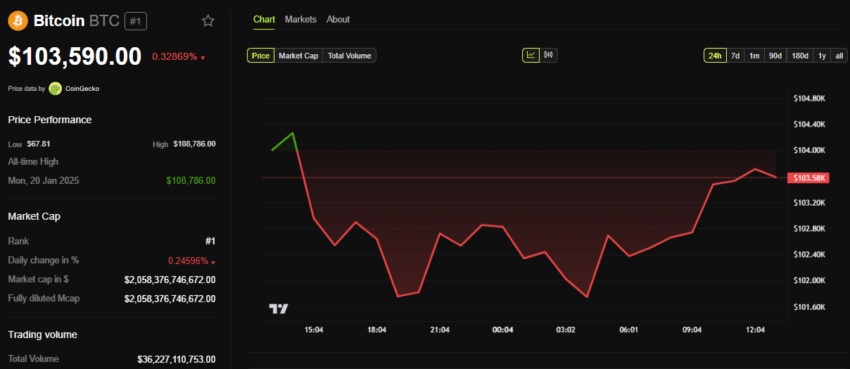The Bureau of Labor Statistics released the Consumer Price Index report on Tuesday, which showed a slowdown in inflation in April.
The price of Bitcoin showed a modest reaction, as this outcome affects the future path of interest rates for the Federal Reserve.
U.S. Consumer Price Index data: Bitcoin remains unchanged amid slowing inflation.
The Bureau of Labor Statistics released its report on the Consumer Price Index (CPI) on Tuesday at 8:30 AM Eastern Time. According to the Consumer Price Index, the inflation rate in the U.S. rose at an annual rate of 2.3% in April, slightly lower than the pace recorded in March.
"U.S. Consumer Price Index: +2.3% year-on-year (estimates +2.4%). U.S. Core Consumer Price Index: +2.8% year-on-year (estimates +2.8%)", according to the Tri News agency.
Immediately after that, the price of Bitcoin remained unchanged, having fallen by 0.3%. At the time of writing this report, the trading price was $103,590.

The muted reaction came amid a general rise in market momentum, and the recent inflation figures did not affect sentiment, as they were in line with expectations.
Consumer Price Index data, an important economic indicator that measures inflation, affects the monetary policy decisions made by the Federal Reserve. When CPI data shows rising inflation, markets typically expect interest rate increases.
However, calming inflation or easing inflationary pressures, as was the case in April, could increase calls for the Federal Reserve to cut interest rates soon. This action could weaken the dollar, but may increase interest in Bitcoin and cryptocurrencies.
One user on Twitter pointed out that "the Consumer Price Index is one of the key indicators for the Federal Reserve, and this release may clarify whether tariffs are pushing inflation up."
Following the Consumer Price Index data, the CME FedWatch tool shows that markets expect a 91.8% probability of a rate cut at the Federal Reserve meeting on June 18.

Consumer Price Index data shows the first signs of tariff-related inflation.
During the press conference following the policy meeting, Federal Reserve Chair Jerome Powell indicated that short-term inflation expectations had risen due to tariffs imposed by Trump. He also stated that it was time to wait before adjusting policy.
And although today's report shows no signs of tariff-related inflation, the general sentiment is that the full impact of new policies on inflation may begin to emerge after several months.
The Federal Reserve's position is that the central bank wants to see the potential impact of tariffs reflected in economic data before allowing it to shape the path of monetary policy.
Powell said: "The risks of rising unemployment and inflation have increased, but they have not yet materialized. They have not actually materialized. Their effects have not yet appeared... Our policy is in a very good position, and it is right to wait for more clarity.
Thus, weakness in payroll numbers next month may be temporary if tariff negotiations continue to have positive momentum.